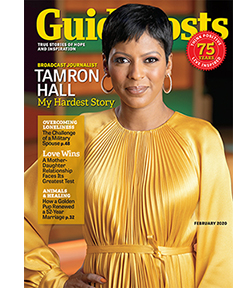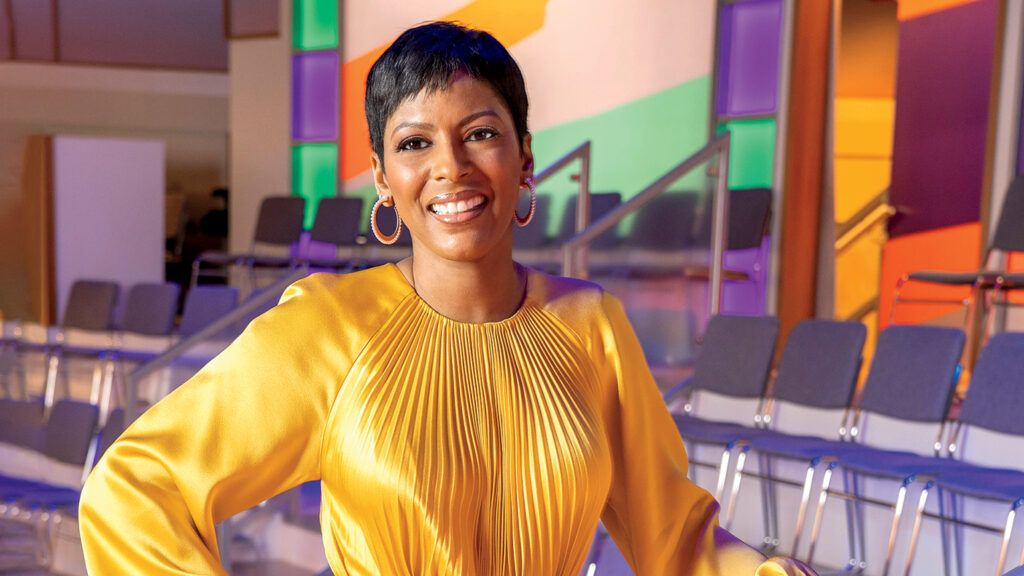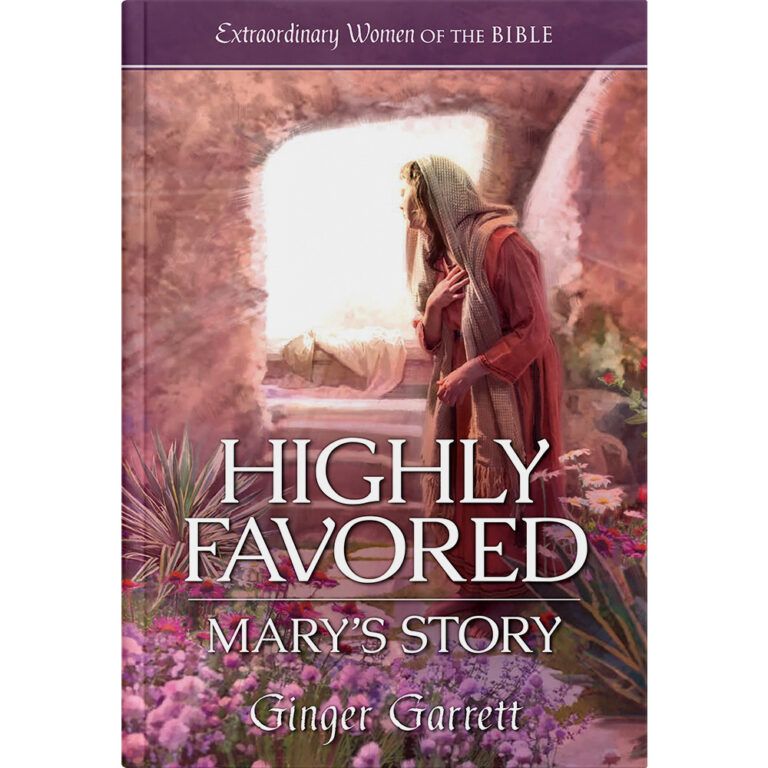You’d think as the host of a daytime talk show, encouraging people to tell their stories, that I would have no hesitation about telling my own. True, there’s a lot I’m willing to talk about. But one of the biggest, saddest, toughest and most important stories I didn’t share for years. I opened up only when I saw that others needed to understand, that they needed to know what I wish I had known back then, that lives could be saved. That my heart need not have been broken.

February 2020 issue of Guideposts
Renate was technically my stepsister, but that’s not how I would have ever described her. She was my sister, plain and simple. I was eight when my mom remarried. Dad—as I learned to call him—and his daughter came into my life. She was 14 years older than me and the coolest person I’d ever seen. Exuberant and generous and so glamorous. I loved going with her to Eckerd Drugs in our hometown of Luling, Texas, and seeing her work her magic with the drugstore beauty products she bought. She’d come out of the bathroom ready to go out, looking amazing.
When it came time for my senior prom, Renate was my stylist, of course. I cringe now at pictures of me in my big hair and my fuchsia dress with long white gloves—this was the late ’80s, mind you—but I was voted best dressed, thanks to Renate. Later, after I graduated from Temple University with a degree in broadcast journalism and was making my way in the business, Renate would visit and give me pointers on what to wear. Once it was a pair of yellow suede pants. “No way,” I said, looking at myself in the mirror.
“Trust me, you look great,” Renate said. As usual she was right.
Although her taste was impeccable in so many ways, in one area it was flawed, and I couldn’t understand why. Not for years. Even as a kid, I remember overhearing Mom and Dad whispering, “That guy is no good for Renate,” or telling her directly, “Why do you want to be with him?” Late one night when I was in my teens, she came home from a date, her face bruised. She told Dad that the guy she was with tried to attack her and she’d jumped out of a moving car.
How was it possible that someone so beautiful and confident on the outside could also be so insecure, seeking validation? Didn’t she know that God loved her and she deserved to be loved by others? Church and prayer were a natural part of our lives. Dad and Renate went to the AME church, while Mom and I worshiped at Beth Eden Baptist. Then we’d all gather at home for Sunday dinner. We prayed without fail before every meal. At Thanksgiving, when Renate and I would fight over who got the turkey wings, we thanked God for every good thing in our lives—and for me that always included my big sister. Why would she look for love in the wrong places?
One time Renate came to visit me in Chicago, where I was anchoring a morning news show. She brought along the person in her life, someone our family knew, and they stayed with me at my townhouse. That first night we hung out, went dancing and had a great time. The second night, they came to the TV station and she helped choose my outfit for the next morning. They seemed comfortable with each other, relaxed. But later that night, I was upstairs and heard a commotion downstairs. A crashing sound, a thud. I rushed down to see what was wrong.
My glass-topped table was knocked over. Renate stood there, looking disoriented, the area above her right eye starting to swell. I glared at the man. “I didn’t do anything,” he said. “I didn’t do anything.”
“Get out,” I said to him.
“She hit me,” he said, insisting it wasn’t his fault.
“Get out,” I said again and grabbed the phone to call Dad.
Dad said, “Get him out of your house. Right away.”
I picked up a broom and waved it threateningly until he finally left. Then I grabbed an ice pack from the freezer to give Renate.
“You’re too good for him,” I said, sounding just like our parents did. “You’re beautiful and smart and wonderful. You can do so much better. You don’t need a guy like him.” I put Renate to bed and told her to get some rest.
Not until years later did I learn how hard it can be to talk someone out of an abusive relationship. You can’t just snap them out of it with words of affirmation. Mom and Dad and I had tried that many times. Victims of domestic abuse get caught in a cyclical bond of trauma, desperately thinking they can change things or that they’re not strong enough to leave. I wish I’d said something much more direct, something Renate could have responded to, something like “You’re in danger with this man. How can I help?”
I was so upset and afraid for both of us—and frustrated—that the next morning I told her that she had to leave too. I couldn’t have her and that man in my house again, no matter what he said. She could come back by herself but never with him. Renate packed up and left, and we didn’t speak for months. Finally, at Dad’s urging, we reconciled. I’m grateful for that. Without it, the burden of guilt over what happened next would have been unbearable. Still, I ask myself: Could I have handled things differently? Could I have made it possible for her to reach out and talk? Could I have saved my sister?
The call came a couple of months later in 2004. Renate had been found floating facedown in her backyard pool. She had been bludgeoned. The police said there had been signs of struggle, hair pulled out, her fingernails broken. Renate had called Mom the night before and told her that she was ending the relationship. Now my sister was dead.
The police told us to sit tight and not make waves while we waited for them to collect more evidence and arrest the person of interest. Meanwhile that man came to the funeral and sat in front of me, the man I knew killed my sister. In the end, he was never charged due to a lack of evidence. Because of that, I can’t even legally say his name.
Dad’s health went into a precipitous decline. Mom said that he died of a broken heart. He believed that it was his job to protect his girls. With Renate, he felt he’d failed. As for me, I didn’t speak publicly about my sister’s death for years. It was too painful, too devastating to talk about. I turned to the Psalms for solace, and my mom and my aunt texted me Bible verses every day. It was only as I learned more about domestic violence that I started to use my position in the media to help others, to reach out to people like Renate, help them free themselves of an abusive relationship. It can be done.
Mustering all my courage, I finally spoke out about our family tragedy at a press conference in 2014. I expected a slew of questions. Instead a reporter shot me down, moving on to some other topic. I was shocked. Didn’t he understand how many people needed help? The numbers are staggering: One in four women and one in seven men have experienced some form of domestic violence, and nearly half of all female murder victims are killed by an intimate partner. Survivors of intimate partner violence lose nearly 8 million days of paid work each year. Didn’t that reporter see how shrouding the issue in secrecy only made it worse?
After that, I decided I need to be braver, to be fiercely honest. “God has not given us a spirit of fear but of power and of love,” says the Bible. I would tap into that power.
Today I use my voice whenever I can to help victims of domestic violence. If you know someone who’s trapped in an abusive relationship, listen to them. Don’t judge. Don’t jump in right away with advice. Let them talk. Get them somewhere safe. (Many churches offer counseling and a place to stay.) Offer to do the legwork, making phone calls, scheduling appointments. To be connected to a resource in your area, you can call the National Domestic Violence Hotline at 1-800-799-7233. I established The Tamron ♥ Renate Fund to aid Safe Horizon, a national organization that offers a variety of programs to support survivors of abuse. I lost my sister, Renate. I don’t want other families to suffer the same.
Every morning I pray before I even leave the house. I check on my infant son, Moses, who is usually still sleeping, kiss my husband and get ready to go to ABC Studios, asking God to give me the right words—words that have meaning and understanding—as I interview people and hear their stories. I say that prayer when I tell my own story, urging others to talk about what they’re going through. Words matter, and the right words can save a life.
For more inspiring stories, subscribe to Guideposts magazine.






